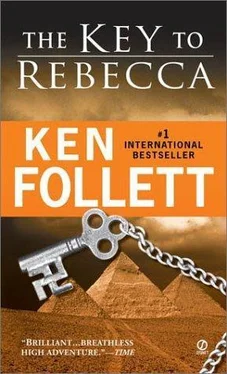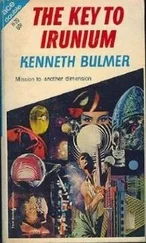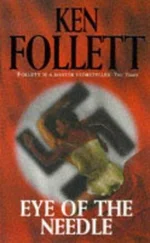Ken Follett - The Key to Rebecca
Здесь есть возможность читать онлайн «Ken Follett - The Key to Rebecca» весь текст электронной книги совершенно бесплатно (целиком полную версию без сокращений). В некоторых случаях можно слушать аудио, скачать через торрент в формате fb2 и присутствует краткое содержание. Жанр: Шпионский детектив, на английском языке. Описание произведения, (предисловие) а так же отзывы посетителей доступны на портале библиотеки ЛибКат.
- Название:The Key to Rebecca
- Автор:
- Жанр:
- Год:неизвестен
- ISBN:нет данных
- Рейтинг книги:4 / 5. Голосов: 1
-
Избранное:Добавить в избранное
- Отзывы:
-
Ваша оценка:
- 80
- 1
- 2
- 3
- 4
- 5
The Key to Rebecca: краткое содержание, описание и аннотация
Предлагаем к чтению аннотацию, описание, краткое содержание или предисловие (зависит от того, что написал сам автор книги «The Key to Rebecca»). Если вы не нашли необходимую информацию о книге — напишите в комментариях, мы постараемся отыскать её.
The Key to Rebecca — читать онлайн бесплатно полную книгу (весь текст) целиком
Ниже представлен текст книги, разбитый по страницам. Система сохранения места последней прочитанной страницы, позволяет с удобством читать онлайн бесплатно книгу «The Key to Rebecca», без необходимости каждый раз заново искать на чём Вы остановились. Поставьте закладку, и сможете в любой момент перейти на страницу, на которой закончили чтение.
Интервал:
Закладка:
At last they came to a large encampment where Wolff made Vandam stop. There were several tents in a cluster, some penned sheep, several hobbled camels and a couple of cooking fires. With a sudden quick movement Wolff reached into the front of the car, switched off the engine and pulled out the key. Without a word he got out.
Ishmael was sitting by the fire, making tea. He looked up and said: “Peace be with you,” as casually as if Wolff had dropped in from the tent next door.
“And with you be health and God’s mercy and blessing,” Wolff replied formally.
“How is thy health?”
“God bless thee; I am well, thank God.” Wolff squatted in the sand
Ishmael handed him a cup. “Take it.”
“God increase thy good fortune,” Wolff said.
“And thy good fortune also.”
Wolff drank the tea. It was hot, sweet and very strong. He remembered how this drink had fortified him during his trek through the desert ... was it only two months ago?
When Wolff had drunk, Ishmael raised his hand to his head and said: “May it agree with thee, sir.”
“God grant it may agree with thee.”
The formalities were done. Ishmael said: “What of your friends?” He nodded toward the taxi, parked in the middle of the wadi, incongruous among the tents and camels.
“They are not friends,” Wolff said.
Ishmael nodded. He was incurious. For all the polite inquiries about one’s health, Wolff thought, the nomads were not really interested in what city people did: their lives were so different as to be incomprehensible.
Wolff said: “You still have my box?”
“Yes.”
Ishmael would say yes, whether he had it or not, Wolff thought; that was the Arab way. Ishmael made no move to fetch the suitcase. He was incapable of hurrying. “Quickly” meant “within the next few days”; “immediately” meant “tomorrow.”
Wolff said: “I must return to the city today.”
“But you will sleep in my tent.”
“Alas, no.”
“Then you will join us in eating.”
“Twice alas. Already the sun is low, and I must be back in the city before night falls.”
Ishmael shook his head sadly, with the look of one who contemplates a hopeless case. “You have come for your box.”
“Yes. Please fetch it, my cousin.”
Ishmael spoke to a man standing behind him, who spoke to a younger man, who told a child to fetch the case. Ishmael offered Wolff a cigarette. Wolff took it out of politeness. Ishmael lit the cigarettes with a twig from the fire. Wolff wondered where the cigarettes had come from. The child brought the case and offered it to Ishmael. Ishmael pointed to Wolff.
Wolff took the case and opened it. A great sense of relief flooded over him as he looked at the radio, the book arid the key to the code. On the long and tedious train journey his euphoria had vanished, but now it came back, and he felt intoxicated with the sense of power and imminent victory. Once again he knew he was going to win the war. He closed the lid of the case. His hands were unsteady.
Ishmael was looking at him through narrowed eyes. “This is very important to you, this box.”
“It’s important to the world.”
Ishmael said: “The sun rises, and the sun sets. Sometimes it rains. We live, then we die.” He shrugged.
He would never understand, Wolff thought; but others would. He stood up. “I thank you, my cousin.”
“Go in safety.”
“May God protect thee.”
Wolff turned around and walked toward the taxi.
Elene saw Wolff walk away from the fire with a suitcase in his hand. “He’s coming back,” she said. “What now?”
“He’ll want to go back to Assyut,” Vandam said, not looking at her. “Those radios have no batteries, they have to be plugged in, he has to go somewhere where there’s electricity, and that means Assyut.”
Billy said: “Can I come in the front?”
“No,” Vandam said. “Quiet, now. Not much longer.”
“I’m scared of him.”
“So am I.”
Elene shuddered. Wolff got into the car. “Assyut,” he said. Vandam held out his hand, palm upward, and Wolff dropped the key in it. Vandam started the car and turned it around.
They went along the wadi, past the well, and turned onto the road. Elene was thinking about the case Wolff held on his knees. It contained the radio, the book and the key to the Rebecca code: how absurd it was that so much should hang on the question of who held that case in his hands, that she should have risked her life for it, that Vandam should have jeopardized his son for it. She felt very tired. The sun was low behind them now, and the smallest objects—boulders, bushes, tufts of grass——cast long shadows. Evening clouds were gathering over the hills ahead.
“Go faster,” Wolff said in Arabic. “It’s getting dark.”
Vandam seemed to understand, for he increased speed. The car bounced and swayed on the unmade road. After a couple of minutes Billy said: “I feel sick.”
Elene turned around to look at him. His face was pale and tense, and he was sitting bolt upright. “Go slower,” she said to Vandam, then she repeated it in Arabic, as if she had just recalled that he did not speak English.
Vandam slowed down for a moment, but Wolff said: “Go faster.” He said to Elene: “Forget about the child.”
Vandam went faster.
Elene looked at Billy again. He was as white as a sheet, and seemed to be on the brink of tears. “You bastard,” she said to Wolff.
“Stop the car,” Billy said.
Wolff ignored him, and Vandam had to pretend not to understand English.
There was a low hump in the road. Breasting it at speed, the car rose a few inches into the air, and came down again with a bump. Billy yelled: “Dad, stop the car! Dad!”
Vandam slammed on the brakes.
Elene braced herself against the dashboard and turned her head to look at Wolff.
For a split second he was stunned with shock. His eyes went to Vandam, then to Billy, then back to Vandam; and she saw in his expression first incomprehension, then astonishment, then fear. She knew he was thinking about the incident on the train, and the Arab boy at the railway station, and the kaffiyeh that covered the taxi driver’s face; and then she saw that he knew, he had understood it all in a flash.
The car was screeching to a halt, throwing the passengers forward. Wolff regained his balance. With a rapid movement he threw his left arm around Billy and pulled the boy to him. Elene saw his hand go inside his shirt, and then he pulled out the knife.
The car stopped.
Vandam looked around. At the same moment, Elene saw, his hand went to the side slit of his galabiya—and froze there as he looked into the backseat. Elene turned too.
Wolff held the knife an inch from the soft skin of Billy’s throat. Billy was wild-eyed with fear. Vandam looked stricken. At the corners of Wolff’s mouth there was the hint of a mad smile.
“Damn it,” Wolff said. “You almost had me.”
They all stared at him in silence.
“Take off that foolish hat,” he said to Vandam.
Vandam removed the kaffiyeh.
“Let me guess,” said Wolff. “Major Vandam.” He seemed to be enjoying the moment. “What a good thing I took your son for insur ance.”
“It’s finished, Wolff,” said Vandam. “Half the British Army is on your trail. You can let me take you alive, or let them kill you.”
“I don’t believe you’re telling the truth,” Wolff said. “You wouldn’t have brought the Army to look for your son. You’d be afraid those cowboys would shoot the wrong people. I don’t think your superiors even know where you are.”
Elene felt sure Wolff was right, and she was gripped by despair. She had no idea what Wolff would do now, but she felt sure Vandam had lost the battle. She looked at Vandam, and saw defeat in his eyes.
Читать дальшеИнтервал:
Закладка:
Похожие книги на «The Key to Rebecca»
Представляем Вашему вниманию похожие книги на «The Key to Rebecca» списком для выбора. Мы отобрали схожую по названию и смыслу литературу в надежде предоставить читателям больше вариантов отыскать новые, интересные, ещё непрочитанные произведения.
Обсуждение, отзывы о книге «The Key to Rebecca» и просто собственные мнения читателей. Оставьте ваши комментарии, напишите, что Вы думаете о произведении, его смысле или главных героях. Укажите что конкретно понравилось, а что нет, и почему Вы так считаете.












